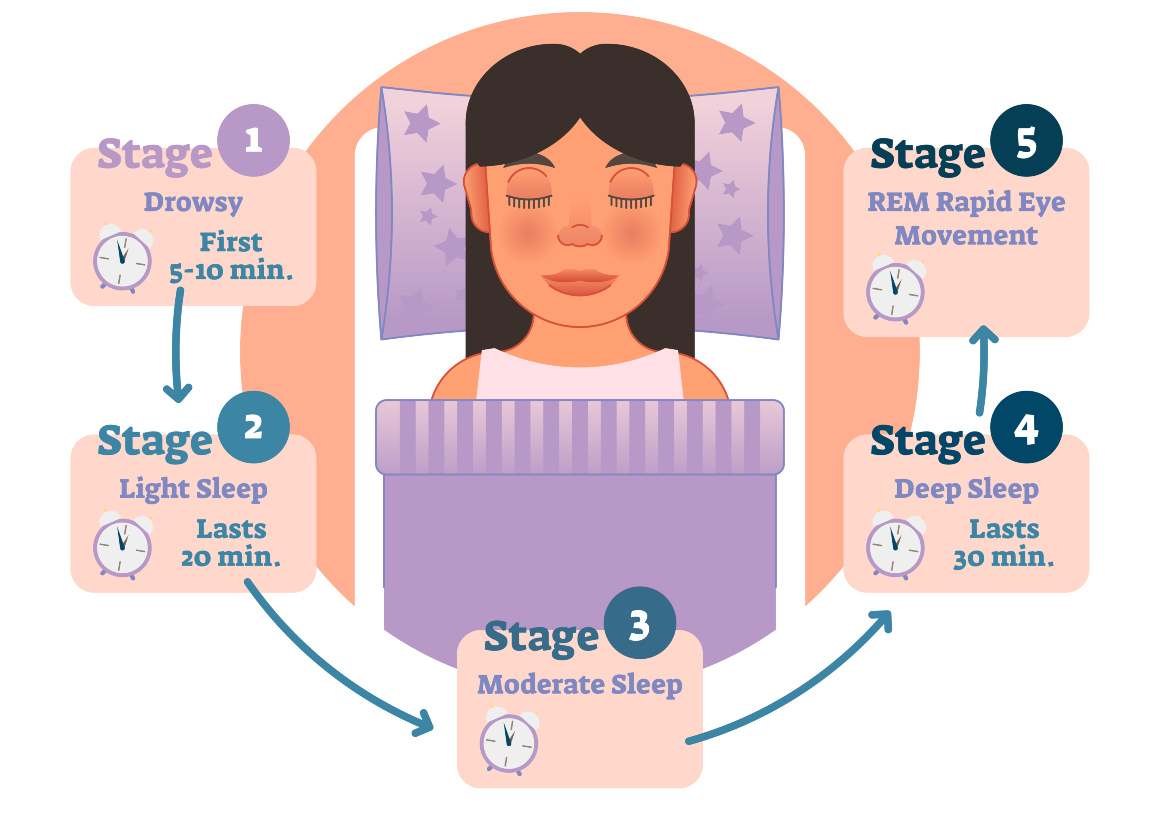REM Sleep : Important to Restorative Rest
Published:
REM sleep, or rapid eye movement sleep, is a fascinating and essential aspect of our nightly rest. In this blog post, we will uncover the significance of REM sleep for mental health and physical transformation that occur during it, in addition to delving into its position within other stages of sleep and how daytime naps influence muscle patterning.
Contents:
We will explore the various stages of sleep and when REM occurs within them. In addition to understanding non-REM stages before entering REM sleep, we'll also discuss how daytime naps contribute to learning muscle patterns.
Furthermore, we will examine factors influencing quality and duration of your slumber – from stress's impact on sleeping habits to lifestyle choices affecting your restorative rest. Lastly, you'll learn about conditions that enhance or disrupt natural progression between NREM (non-rapid eye movement) & REM cycles such as narcolepsy.

Understanding REM Sleep
Rapid eye movement (REM) sleep is a crucial part of the sleep cycle, playing an essential role in maintaining overall mental and physical health. During this stage, the body and brain undergo several changes such as rapid eye movements, fast and irregular breathing, increased heart rate, and temporary muscle paralysis. In this section, we will discuss the importance of REM sleep for mental health and explore some of the physical changes that occur during this vital phase.
The Importance of REM Sleep for Mental Health
During REM sleep, the brain undergoes a process of synaptic plasticity which facilitates memory consolidation and neural rewiring. This occurs through a phenomenon known as synaptic plasticity or neural rewiring. Studies have shown that individuals who are deprived of REM sleep experience difficulty with learning new tasks or retaining information learned earlier in their day (source). Furthermore, insufficient amounts can lead to mood disorders like depression or anxiety due to its role in regulating neurotransmitters such as serotonin.
- Mood regulation: Adequate levels help maintain emotional stability by influencing hormone production and release within our bodies;
- Cognitive functioning: It allows us to think clearly and make sound decisions throughout daily life;
- Dreaming: Most vivid dreams happen during this period because it's when our minds are most active while asleep.
In addition to these cognitive benefits, getting enough restorative rest also promotes physical well-being by allowing time for the body to repair itself and grow new cells. Athletes and those healing from injury particularly benefit from restorative sleep, as it helps with muscle growth and mending of tissues.
Physical Changes During REM Sleep
During this phase of sleep, several physiological changes occur that distinguish it from other stages. Some notable transformations include:
- Rapid eye movements: Our eyes dart back and forth beneath closed eyelids;
- Increased brain activity: Neurons fire at a faster rate than during non-REM (NREM) sleep;
- Elevated heart rate and blood pressure: Both increase slightly compared to NREM phases;
- Muscle paralysis: Known as "atonia," our muscles become temporarily paralyzed to prevent us from acting out dreams (source). This protective mechanism ensures we don't accidentally injure ourselves or others while asleep.
The combination of these physical changes allows our bodies and minds to rejuvenate effectively throughout the night. As such, ensuring you achieve an adequate amount of REM sleep each evening is essential for maintaining optimal mental and physical health.
REM sleep is essential for mental health and overall wellbeing, so understanding its stages and effects on the body can be beneficial. Building upon this knowledge of REM sleep, it's important to understand how daytime naps contribute to learning muscle patterns.

Factors Influencing Quality and Duration of Sleep
The quality and duration of sleep are crucial for maintaining overall mental and physical health. However, various factors can influence the amount of restorative rest a person gets each night. In this section, we will explore some common elements that affect sleep patterns, including stress levels and lifestyle choices.
Impact of Stress on Sleeping Habits
Stress is a significant factor affecting sleep quality. When an individual experiences high levels of stress or anxiety, their body produces cortisol - a hormone responsible for keeping them alert in response to perceived threats. Elevated cortisol levels can make it difficult to fall asleep or stay asleep throughout the night.
- Mindfulness practices: Incorporating mindfulness techniques such as meditation or deep breathing exercises into your daily routine can help reduce stress levels and improve overall well-being.
- Create a bedtime routine: Establishing a consistent bedtime routine signals to your body that it's time to wind down for the day. This may include activities like reading, taking a warm bath, or practicing relaxation techniques before bed.
- Avoid stimulants close to bedtime: Consuming caffeine or nicotine too close to bedtime can interfere with falling asleep by increasing alertness and heart rate. Aim to avoid these substances at least four hours before going to bed.
Lifestyle Choices Affecting Your Restorative Rest
Beyond managing stress effectively, certain lifestyle choices also play an essential role in determining how much total shut-eye individuals need. Some examples include obesity rates, alcohol consumption habits, exercise routines, diet and nutrition choices, and exposure to natural light during daytime hours.
- Maintain a healthy weight: Obesity has been linked to an increased risk of sleep apnea, which can disrupt normal sleep patterns. Eating a balanced diet and engaging in regular physical activity can assist in keeping weight within healthy parameters, thus aiding with the quality of one's sleep.
- Avoid alcohol before bedtime: While alcohol may initially induce drowsiness, it ultimately interferes with the quality of your rest by disrupting REM sleep. Aim to limit or avoid alcohol consumption in the evening for better slumber.
- Exercise regularly: Engaging in regular physical activity has been shown to promote better sleep quality. However, exercising too close to bedtime may have the opposite effect due to increased adrenaline levels - aim for morning or early afternoon workouts instead.
- Prioritize proper nutrition: Consuming a well-balanced diet rich in nutrients such as magnesium, calcium, and vitamin D is essential for supporting optimal sleeping habits. Foods high in these nutrients include leafy greens, dairy products, nuts, and seeds.
Natural Light Exposure
An often-overlooked factor influencing both duration and quality of shut-eye is exposure levels experienced throughout daytime hours - specifically those related directly to sunlight's effects upon circadian rhythms (our internal body clock). By spending time outdoors each day soaking up some rays from the sun itself while also allowing plenty of opportunities for indoor spaces to receive adequate amounts of ambient lighting via windows, openings, etc., individuals are more likely able to establish healthier cycles between periods of wakefulness vs resting states, thus resulting in improved overall sense of wellness within their lives as a whole unit functioning harmoniously together towards the common goal of achieving the maximum potential human beings are capable of attaining.
In conclusion, addressing the factors that influence sleep quality and duration is crucial for maintaining overall mental and physical health. By managing stress levels effectively, making healthy lifestyle choices such as maintaining a balanced diet and exercise routine, avoiding alcohol before bedtime, and prioritizing exposure to natural light during daytime hours - individuals can work towards achieving better restorative rest each night.
Realizing the elements that can shape sleep quality and length, such as tension amounts and lifestyle decisions, is essential for keeping up a sound dozing cycle. Additionally, conditions like narcolepsy can also disrupt natural progression between NREM and REM stages of sleep which should be taken into consideration when attempting to improve restorative rest.

Conditions That Enhance or Disrupt Natural Progression Of Sleep Cycles
The natural progression of sleep cycles, including the transition between NREM and REM stages, is vital for preserving optimal physical and mental wellbeing; however, a range of conditions may hinder or promote this process. However, several factors can enhance or disrupt this process, leading to disturbances in sleep quality and duration. In this section, we will discuss some common conditions that may affect your sleep cycle's natural progression.
Narcolepsy's Effect on Natural Progression Between NREM & REM Stages
Narcolepsy is a neurological disorder characterized by excessive daytime drowsiness and sudden attacks called "sleep attacks." People with narcolepsy often experience disruptions in their normal sleep patterns due to an inability to regulate the timing of REM sleep properly. As a result, they may enter REM stage almost immediately after falling asleep instead of following the typical NREM stages. This abnormality not only affects nighttime rest but also leads to uncontrollable episodes of falling asleep during the day.
Age-Related Changes in Sleep Patterns
As people age, their sleep patterns change significantly. Older adults tend to have more difficulty falling asleep and staying asleep throughout the night compared to younger individuals. These changes are primarily attributed to alterations in circadian rhythms - our internal biological clock responsible for regulating various physiological processes such as body temperature fluctuations and hormone secretion levels throughout 24-hour periods - which become less robust over time.
- Males: Research has shown that men are more likely to experience disruptions in their sleep cycles than women. It is possible that this discrepancy in sleep cycles between men and women may be due to differences in hormone levels, stressors, or daily routines.
- Over 50 years old: As mentioned earlier, age-related changes in circadian rhythms can lead to disturbances in the natural progression of sleep stages. Older individuals tend to need more time spent awake during the day and may find it difficult to drift off at night.
The Impact of Antidepressants on Sleep Cycles
Many antidepressant medications can affect sleep architecture by altering neurotransmitter levels within the brain. Some antidepressants may suppress REM sleep altogether or cause fragmented REM episodes - both scenarios leading to disrupted restorative processes essential for maintaining mental health and well-being. If you suspect your medication is affecting your sleep quality, it's crucial to consult with your healthcare provider before making any adjustments or discontinuing treatment.
Withdrawal from Drugs and Alcohol Affecting Sleep Patterns
Alcohol withdrawal syndrome (AWS), which occurs when an individual stops consuming alcohol after prolonged use, can severely disrupt normal sleeping patterns by causing insomnia, vivid dreams, nightmares, and other symptoms related to poor-quality rest. Similarly, withdrawal from drugs such as opioids or benzodiazepines may also result in disturbed NREM and REM stages - further exacerbating existing issues with substance dependence.

Lifestyle Factors Influencing Sleep Cycle Progression
In addition to medical conditions and medications impacting our natural progression through various sleep stages, lifestyle factors can also play a significant role. Some common culprits include:
- Stress: High levels of stress can lead to increased cortisol production - a hormone responsible for regulating our "fight or flight" response. Elevated cortisol levels may interfere with the ability to fall asleep and maintain restorative sleep throughout the night.
- Obesity: Excess body weight has been linked to various sleep disorders such as obstructive sleep apnea (OSA), which disrupts normal breathing patterns during slumber and interferes with natural NREM-REM cycles.
- Alcohol consumption before bedtime: While alcohol may initially induce drowsiness, it often leads to fragmented sleep later in the night due to its impact on REM stage duration and quality.
In conclusion, understanding how certain conditions enhance or disrupt your natural progression through NREM and REM stages is essential for maintaining optimal mental health and overall well-being. By addressing these issues through appropriate medical interventions or lifestyle changes, you can improve your chances of achieving better-quality rest each night.
FAQs in Relation to Rem Sleep
What Does REM Do for Your Sleep?
REM (Rapid Eye Movement) sleep is a crucial stage of the sleep cycle, characterized by rapid eye movements, increased brain activity, and vivid dreaming. It plays an essential role in memory consolidation, learning processes, emotional regulation, and overall cognitive function. During REM sleep, the body also undergoes physical changes such as muscle relaxation to facilitate restorative rest.
Why Is REM Sleep Important Psychologically?
Psychologically speaking, REM sleep contributes significantly to mental health and well-being. This stage facilitates neural connections that help process emotions and memories from daily experiences. Additionally, it aids in creative problem-solving abilities and supports healthy mood regulation. Lack of sufficient REM sleep can lead to impaired cognitive functioning or even exacerbate existing psychological issues.
Conclusion
During REM sleep, our body undergoes significant changes, such as muscle paralysis and rapid eye movement.
Stress and lifestyle decisions can affect the amount and quality of REM sleep. Understanding the stages of sleep leading up to REM can help improve overall restorative rest.













